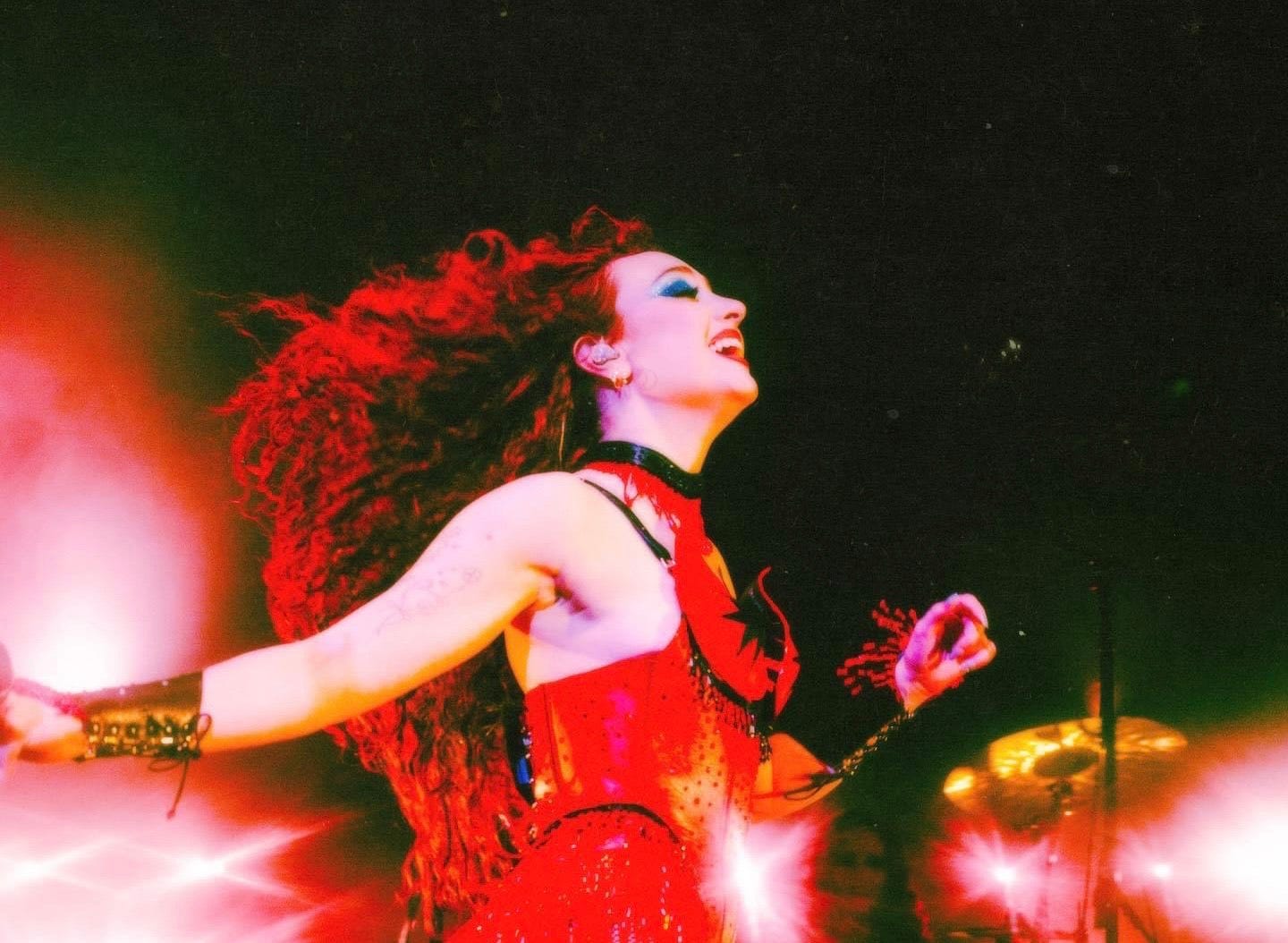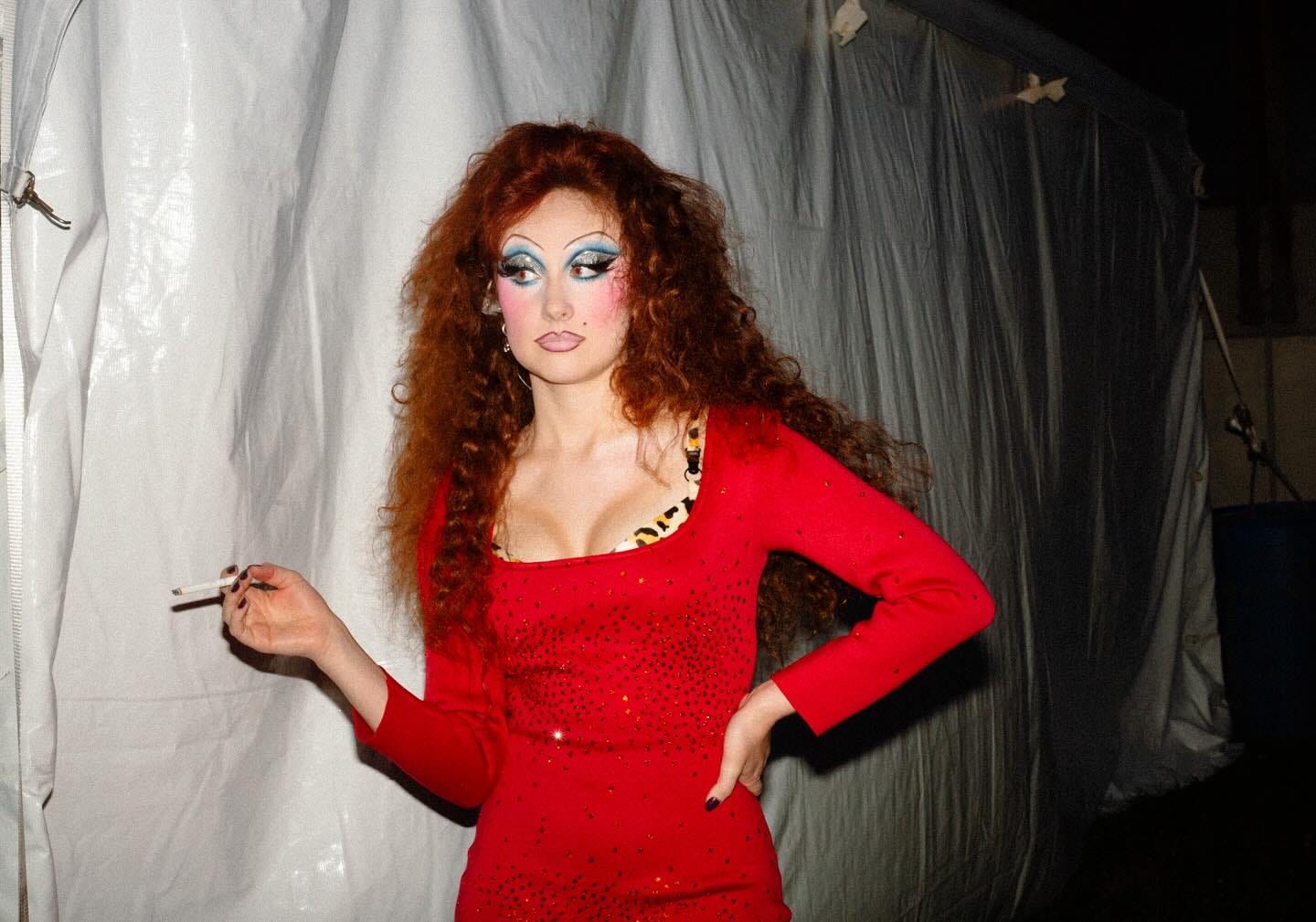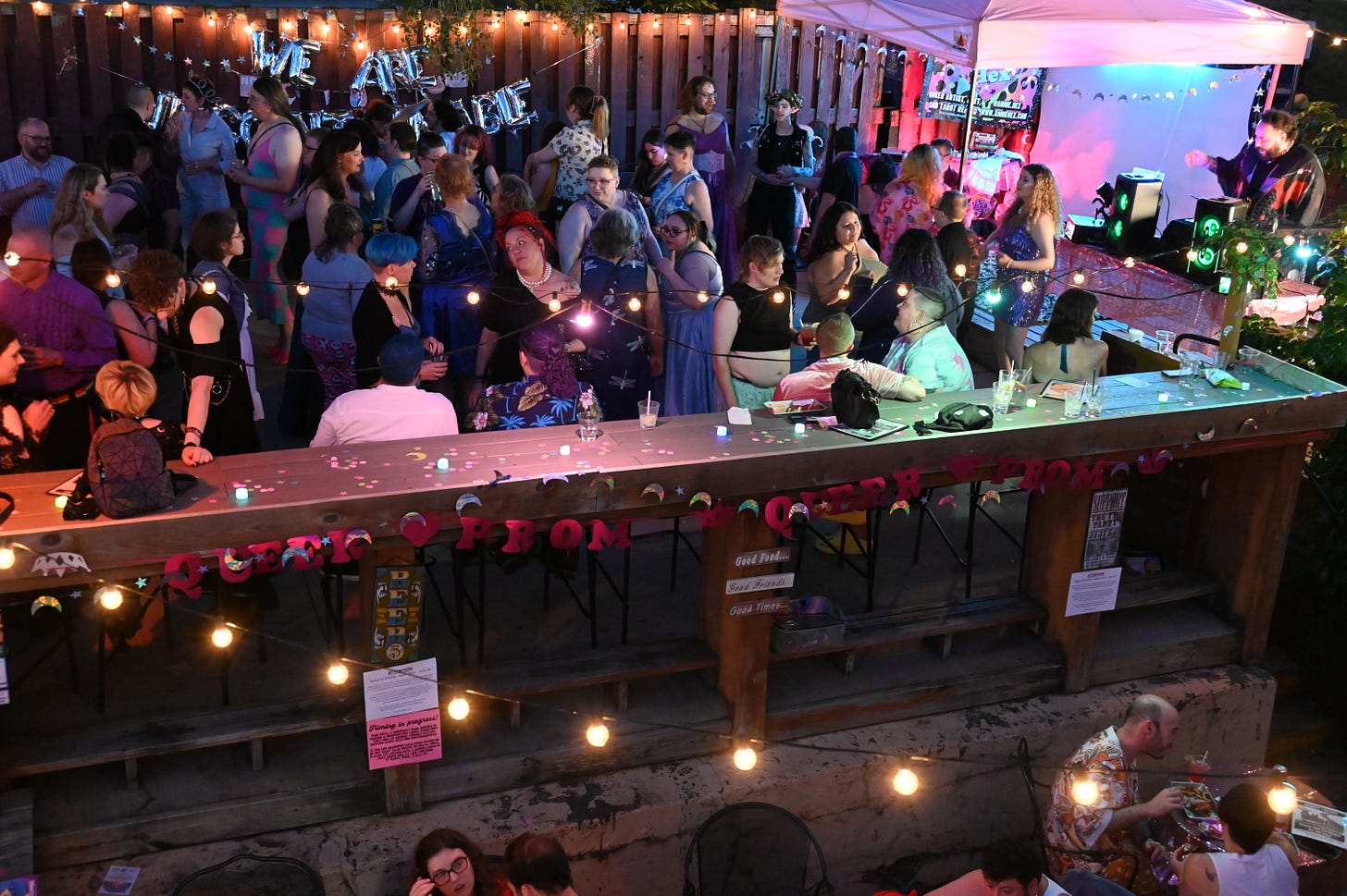why chappell roan’s rise matters.
The rapid glow-up of your favorite pop star’s favorite pop star hits different from a small Midwestern town.

Queering the Burbs is a regularly-published distillation of pop culture, politics and queerness written by Joe Erbentraut. If you like what you see, please consider subscribing (it’s free!), liking or sharing this piece.
No matter where you turn right now, it feels like she’s there.
As the popular lore goes, Chappell Roan’s ascent began this spring with a trio of events that felt almost too perfectly timed to have been real: a slot opening for Olivia Rodrigo’s sold-out U.S. tour, followed by a lipstick-stained-teeth NPR Tiny Desk Concert, and an instantly viral Coachella set.
Almost overnight, it seemed, Roan’s number of Instagram followers and Spotify streams surged dramatically. Suddenly she was getting shoutouts from the likes of Elton John, RuPaul, and Lady Gaga, and in the weeks that have followed, her festival appearances have continued to one-up each other. From Hangout to Gov Ball to Bonnaroo, the crowds keep getting bigger and her on-stage wardrobe—paying tribute to everyone from Lady Miss Kier and Lady Liberty to Divine—continues to evolve and grow more epically over-the-top with each show. Just last week, her The Rise and Fall of a Midwest Princess hit the Billboard 200’s top 10 for the first time, something that almost never happens a full nine months after an album dropped.
Of course, no very swift, very public rise like this would happen without some form of a backlash. Some social media users have taken Roan’s sudden fame to be evidence that she is some sort of “industry plant.” Others (namely RuPaul’s Drag Race villain Plane Jane in a since-deleted post) have even gone as far as to criticize Roan’s unflinchingly queer output as “performative” while seemingly ignoring the fact that Roan herself is queer and has centered queerness in her work for many years now.

All of this seems to be taking a toll on the queer young woman at the center of all this success. In a recent interview with Drag Race star Trixie Mattel for Paper magazine, she admitted to feeling “scared” and “freaked out” by all of the public attention that has come hand in hand with her recent success, and she echoed these sentiments in comments onstage during a recent performance in Raleigh.
The discourse surrounding Roan’s rise and the early signs that she might be struggling with aspects of it I believe has been missing some critical context. Lost in much of the discussion is an exploration of why her music is resonating so deeply with fans that tickets to her Lollapalooza aftershow at the Vic Theatre in August sold out almost instantly. Why resale tickets to her tour are going for at least 10 times their list price. Why Roan is literally on the tips of almost everyone’s tongues right now.
First of all, of course, we do have social media algorithms to thank. The way that TikTok’s algorithm works, in particular, is to rapidly learn which content you are most drawn to and proceed to show you increasingly more of that type of content, sometimes creating a false sense of what is truly in the zeitgeist vs. what is now big in your personal zeitgeist. In other words, liking, reposting, or commenting on one or two Chappell Roan memes will have an almost instant effect on your #fyp feed, and the more you continue to interact with that content, the more it will continue to be fed to you.
But this is obviously not just an online sensation. In and around my suburban Chicago town of some 26,000 residents, I keep coming across Roan’s music in decidedly offline settings. Her name frequently comes up in conversation with friends and acquaintances at farmers’ markets and microbreweries. When I waited in line at a local shop for Record Store Day, her limited-edition single was the release I heard the most chatter about from fellow shoppers. At Batavia’s New Moon Vegan cafe, the menu lately has often included pink pony cookies inspired by Roan’s anthemic bop “Pink Pony Club” (and a portion of the proceeds from the sale of these cookies also benefits local queer advocacy group Youth Outlook). Local artists Janelle Rae and Meg Schmeg are also both selling incredibly fun Chappell-themed merch right now, too. (Go shop from Janelle and Meg, right now!)
When I ask my suburban friends and neighbors what attracts them to Roan’s music, it goes without saying that the quality of the music itself is front and center. Her songs are incredibly catchy and well produced, but the appeal is so much more than that. The songs themselves pull elements from so many disparate genres and musical stylings that they readily lend themselves to cross-generational appeal.
For the Gen Xers, we have synth-heavy production with a side of glam-y electric guitar on songs like “Good Luck, Babe,” which recalls songs like Stevie Nicks’s “Stand Back” or Wham’s “Last Christmas.” For millennials, we can enjoy the powerhouse vocals that appeal to the part of our souls that will forever scream the lyrics to Kelly Clarkson’s “Since U Been Gone.” And for the Gen Zers, it’s the deeply personal, confessional songwriting that speaks directly to the experience of feeling alienated by your surroundings and yearning for something better. And there’s clearly even something here for the boomers, judging by this older fan who went viral while singing every word to “Pink Pony Club” at a recent show.
But beyond some of the more technical elements of Roan’s music, I think it truly is its authenticity and explicit queerness that resonates for most fans. It is almost surreal to see an out queer woman ascend on the charts all while being her full queer self, and that vulnerability comes through like a lightning bolt on each and every one of her songs. While DJing Annie Hex’s Queer Proms in recent months in Batavia, I noticed that the one or two Chappell Roan songs I’d typically play in my set were consistently getting among the most enthusiastic reactions of the night. Last weekend, for our latest Queer Prom at Sidecar Supper Club, I again played two of her songs, while the drag artist Skater Gaytor showed up in full Chappell Roan-inspired garb to perform “Hot to Go.” Their performance? Instantly iconic.

Just as we had done at previous Queer Proms, we danced and screamed to Chappell Roan’s music. We hugged and cried. We laughed and kissed. And by the end of the night, we played “Pink Pony Club.” The defiant lyrics couldn’t have felt more appropriate for the occasion.
God, what have you done?
You're a pink pony girl
And you dance at the club
Oh mama, I'm just having fun
On the stage in my heels
It's where I belong down at the
Pink Pony Club
I'm gonna keep on dancing at the
Pink Pony Club

For so many of us out here in the hinterland, Chappell Roan’s music strikes such a chord because we know exactly what it feels like to live somewhere that represses and makes invisible anything that challenges ideas of normalcy and tradition. What other major artists have spoken so directly to this deeply rural, suburban experience? For many of us, we dreamed of getting out and finding our Pink Pony Club—and many of us not only did just that, but proceeded to hold onto that seed and plant it right where it doesn’t “belong”—out here in the suburbs, so that other people could have it better than we did. So that queer kids can grow up to become queer adults. So that we may survive and thrive.
That’s exactly what LGBTQ+ affirming events and spaces like Queer Prom do. They give our community the chance to be our full selves in a safe, accepting, celebratory space. At a time when bigots can’t even stand the idea of seeing our Pride flags being flown at our homes and businesses or in front of our City Halls (more to come on that soon!), we need more events and spaces like these desperately, we need them to be handsomely funded by sponsors and investors, and openly welcomed by elected officials and community leaders, and we need them beyond just Pride Month.
So I completely understand why Chappell Roan feels overwhelmed—she’s providing visibility and filling a need that has gone virtually unmet for so long, but she is just one person. It is my hope that she takes it easy as her career continues to ascend. And it is also my dream that we see 100 more Chappell Roans take wing as a result of her success. It just can’t end here.
LINK DUMP
Al Jazeera: ‘Scared as hell:’ Climate scientists risk jobs, jail to save dying planet
The Guardian: Can you inherit memories from your ancestors?
Culture Study: Reimagining Boyhood
Eater: The Food That Makes You Gay
Indeed, Charli XCX’s Brat is finally here and, indeed, I adore it. My favorite track keeps changing but “Talk Talk” and “Everything Is Romantic”? There’ll be more to say in due time but how about we just watch Chloë Sevigny in the “360” video again?



